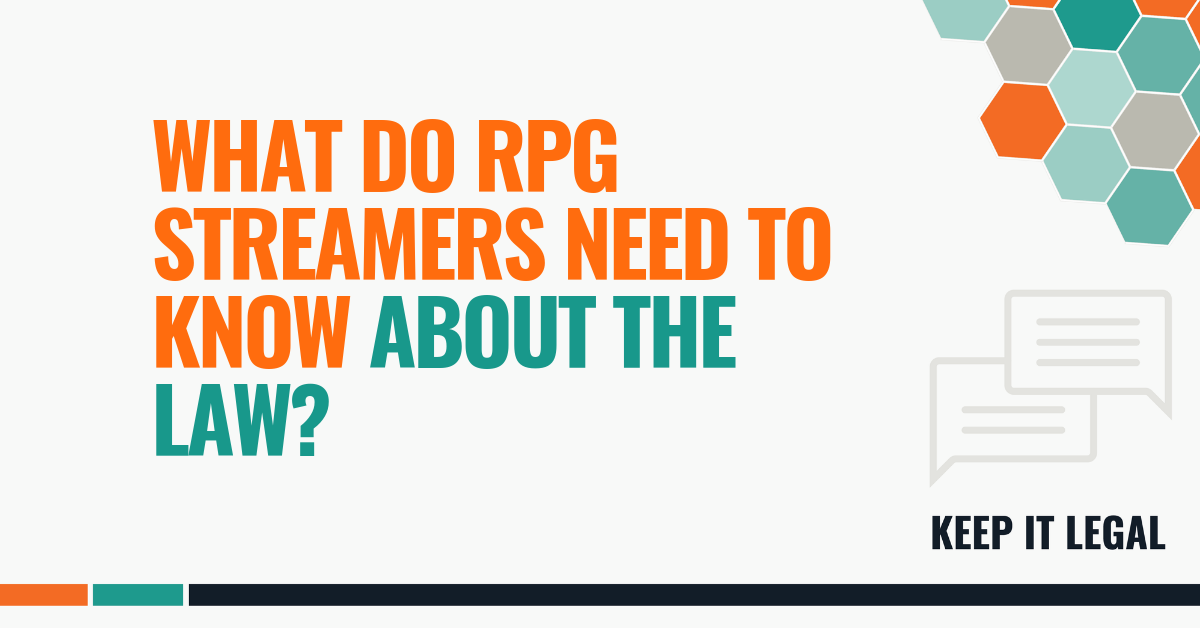Streaming role-playing games (like Dungeons & Dragons) has become a big business in recent years. What legal considerations do RPG streamers have to keep in mind as they launch and monetize their shows?
What is RPG streaming?
RPG streaming occurs when a group of people plays a role-playing game online for public consumption. Sometimes the streamers are all playing together in the same room; sometimes they’re remote from each other and playing together using video chat software (like Google Hangout). Streaming can be live or time-delayed (VOD) and can include both video and audio or just audio (the latter, essentially, is a podcast). The most popular RPG streaming platform is Twitch, although YouTube also has an important presence in the RPG streaming economy.
The most-watched D&D stream is almost certainly Critical Role, which features a group of Hollywood voice actors’ weekly D&D game. This year, they launched a Kickstarter to turn some of their old episodes into animated shows, and they ended up raising over $11 million dollars. This campaign set a new Kickstarter record for most money raised for projects in the “film” category. Most streamers won’t achieve that level of success, but there are more and more shows coming online with a plan to monetize their content.
I wrote about intellectual property law issues related specifically to D&D in my 2017 post D&D & IP. I won’t rehash that info here, so click that link to get up to speed.
Regarding RPG streaming in general, there are a few main legal points to keep in mind:
Who owns the game?
The publisher of the RPG that you’re playing owns that content. That includes brand names, such as the name of the game itself (which is a trademark) as well as any images and text included in the game books (those fall under copyright law). So if you’re streaming a D&D game, Wizards of the Coast, D&D’s publisher, owns the trademarks DUNGEONS & DRAGONS, D&D, and the names of their unique characters, creatures, places, and such.
This means that if they wanted to stop you from streaming their game, they arguably could. However, most, if not all, RPG publishers have no interest in doing so. They recognize that streamers are some of their biggest fans and they help spread the word about their games and teach others how to play them.
But there’s always a limit. So, for example, if you were streaming a D&D game that included content that WOTC found objectionable or threatening to their brand (for example, explicitly racist or pornographic content), I could see a scenario where they would want to step in and try to prevent you from continuing to do so. As long as you’re playing the game within reasonable, socially-acceptable boundaries, you’re probably fine.
You could also run into issues with the streaming service itself. Twitch recently signaled that they are willing to take legal action against users who post offensive or copyrighted content. Likewise, YouTube is not shy about demonetizing or banning users who breach their terms and conditions.
What about music?
Many streamers play music in the background to enhance the viewing/listening experience. Make sure that the music that you’re playing is either free to use or, alternatively, that you have a license to use it. Just because you own an MP3 doesn’t mean that you have the right to publicly stream that song, and this is an easy way to have your content taken down. Music rights are complex, so you want to be extra-careful about this and you should consult with an intellectual property attorney if you have any questions.
Who owns your content?
You do. In the U.S., at least, you own the copyright to anything you create upon creation. So the actual content of your stream – leaving out the IP that’s owned by the RPG publisher, as described above – is yours. If you and your fellow players don’t have any kind of written contract, then you most likely own all of the intellectual property embodied in your stream as a “joint work” – meaning, you each own an equal share.
Let’s say you want to own the stream yourself for some reason. Maybe you’re an experienced streamer, you have your own audience that you’re bringing to the table, and you’re paying for the space, equipment, and web hosting. You can enter into a written contract with your fellow players whereby you own all of the content yourself, and they are just participants or independent contractors. However, this is the type of agreement that should be drafted by an attorney. And no matter what, it should definitely be in writing and signed by all parties.
How do you protect your intellectual property?
If you have a stream that has become popular, or that you plan to monetize, you should strongly consider registering the name of the stream as a trademark with the United States Patent and Trademark Office. This will help to prevent others from using the same or a similar name for their own streams or for related products. The trademark registration process has a lot of costs and pitfalls, so this is another area where an experienced attorney would come in handy.
There may be other elements that are worth registering, including logos, taglines, and character names (trademarks) as well as images and written text (those would fall under copyright law and would be registered with the U.S. Copyright Office). Speak to your attorney before jumping into any of these.
Wrapping up
RPG streaming is an exciting new medium. It gives RPG players an opportunity to share the games they love with fans all around the world, to build an audience, and to generate revenue while developing an entertainment/media brand. As long as you follow the rules of the road, the possibilities are endless. Happy streaming!
Have legal questions about your RPG stream? Contact me


